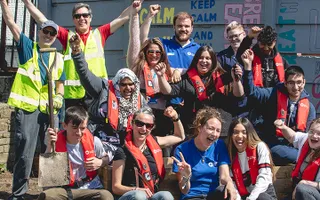In November 2020, we signed up to the Power of Youth Charter and pledged our commitment to support young people from all walks of life through our Year of Youth campaign.
The Power of Youth Charter is a framework created by #iwill and their various youth partners that enables us to empower more young people to shape decisions, take social action and make a positive difference.
Our pledge to the Charter is our Year of Youth 2021 campaign, which serves to ensure we provide opportunities for young people across our three engagement pillars: social action, skills development & employability, and health & wellbeing.
We want to raise the profile of our youth focused work, both internally and externally, and promote a 'youth friendly' culture across the Trust.
Engaging young people in our work
We know we can offer hands-on experiences that will enable young people to develop key life skills and talents for future employability. We also know that, by engaging young people in our work, our canals and rivers will be in safe and capable hands for generations to come.
There are three key ways in our Year of Youth Campaign sets out to achieve this:
1. Effective communication
By making our communications and content relevant, we reach and resonate with young people more effectively.
We engage youth in two ways. First, directly with young people who already have an interest in our work, and secondly through utilising influencers to highlight us through their platforms and networks, reaching new audiences and widening our appeal.
2. Offering and delivering a range of opportunities
Our Youth Engagement Strategy encompasses three distinct offers: social action, skills development & employability, and health & wellbeing. Through these, we support and develop young people from all walks of life in areas that matter most to them.
3. Bringing youth audiences together
We connect our youth audience with others through relevant content and communication across the year, which conincide with our quarterly updates.
POWER challenges
We bring our Year of Youth campaign to life through quarterly POWER challenges. These are designed to raise awareness of, and build support for, our youth engagement work, internally and externally.
Combined together, these challenges bring together our regions and create a coordinated approach to our offers. They enable us to confidently demonstrate the impact of our work to colleagues, partners, parents and influencers, funders, policy makers and most importantly, young people themselves.
Our quarterly challenges are:
1. Sharing the POWER and laying the foundations (Jan - Mar)
Spreading the word about our Year of Youth campaign cements a strong foundation to build from, and aims to attract young people from the start.
We want everyone involved in the Trust, internally and externally, to shout about our youth work, especially the young people we already have connections with.
2. Collating content (Apr - Jun)
Content is key. Without it, we can't demonstrate our impact and encourage other young people to get involved.
Sharing stories of young people benefitting from our support serves as relatable and inspiring content for others and helps maintain our momentum.
3. Identifying and building an influencer database (Jul - Sep)
Within our POWER Charter is the need to work collaboratively with other groups and organisations. It is through these partnerships that we'll be able to build an influencer network to help us extend our engagement with more young people.
It's important to remember that influencers are individuals, not organisations. However, it's often more effective to work with organisations to discover key individuals.
We will be looking to identify schools, colleges, youth groups, family and faith groups, and/or training providers, all of which have a close involvement with young people.
4. The POWER of fun (Oct - Dec)
Above all, we want young people's engagement with us to be a fun and enjoyable experience. So, we want our staff, volunteers and partners to think about something they loved doing in their youth and identify the feelings and soft skills involved that made it so enjoyable.
Acknowledging the associated emotions and actions will enable us to continue to develop activities that are enjoyable, relevant and beneficial, to young people today.






